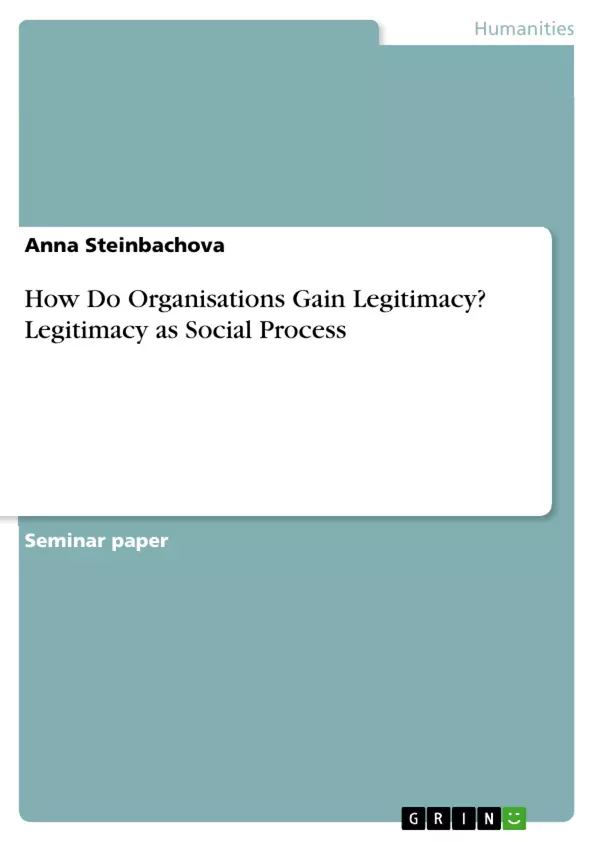In her paper, the author comes from the idea that there is not one definition of legitimacy and try to summarize the arguments on what legitimacy is. Boyd (2000) suggests that legitimacy is dependent on social structure, systems and norms and that legitimation is a social process, however it is not clear how large a part of the social system must confer its approval for an organisation. These statements she also analyses.
In her paper she argues that there is a plethora of theories analysing the gaining of legitimacy, however the process of gaining legitimacy and its establishment depends on diverse factors. To support the argument, she has researched and compared various theories and thus discussed different aspects on how legitimacy is gained. The paper is organised as follows: firstly, she will sum up the theories on what legitimacy means and how is it approached by different authors. Secondly, she discusses the questions of actors and who establishes legitimacy, then I focus on the theories about what role do resources play in establishing legitimacy and lastly, I analyse the approach of legitimacy as a constraint.
Another thesis underlying her paper is from Deephouse (1996) who argues that organizational legitimacy is defined as a status conferred by social actors. He states that legitimacy depends on the perspective of a particular social actor, whose values and expectations for action should be congruent with the aspiring legitimate organisation. Moreover, the social actors approve legitimacy for an organisation, where only certain actors have the authority to confer legitimacy, however they need to be identified first. In her seminar paper she also discusses Hybels (1995) who theorizes that legitimation comes from the actors through conferral of resources and communication of positive reputation, however she points out the resource-based view from Tilling (2010) where he suggests that legitimacy is an operational resource too. During her research, she discussed several authors who research the aspects of legitimacy important for her paper. Suchman (1995) and Hamidu (2015) who analyse the concept of legitimacy, Dowling and Pfeffer (1975) who address the importance of resources and the idea of legitimacy as a constraint, Hybels (1995) whose work opposes the argument about resources of the two authors, and other authors who contribute to her topic.
Inhaltsverzeichnis (Table of Contents)
- Introduction
- What is legitimacy?
- Who establishes legitimacy?
- Legitimacy and resources
- Legitimacy as a constraint.
- Conclusion
- References
Zielsetzung und Themenschwerpunkte (Objectives and Key Themes)
This paper aims to explore the multifaceted nature of organizational legitimacy by examining various theoretical perspectives and analyzing the factors that contribute to its establishment. The paper seeks to understand how organizations gain legitimacy in a complex social environment.
- Different conceptions of legitimacy and their underlying assumptions.
- The role of social actors and stakeholders in conferring legitimacy.
- The significance of resources and their contribution to legitimacy.
- Legitimacy as a constraint on organizational actions.
- The interplay of social norms, values, and expectations in shaping legitimacy.
Zusammenfassung der Kapitel (Chapter Summaries)
- Introduction: This chapter sets the stage for the paper, introducing the concept of organizational legitimacy and highlighting its centrality in organizational theory. It discusses key contributions from prominent scholars such as Max Weber, Dowling and Pfeffer, and Suchman. The chapter also outlines the research question and the paper's structure.
- What is legitimacy?: This chapter explores the various theoretical perspectives on legitimacy, examining different definitions and emphasizing the importance of norms, values, and beliefs. It analyzes the works of prominent scholars, including Suchman, Dowling and Pfeffer, and Hamidu, highlighting their contributions to understanding legitimacy.
Schlüsselwörter (Keywords)
Organizational legitimacy, social norms, values, beliefs, stakeholders, resources, constraints, social actors, legitimation process, social system, organizational theory, congruence, value system.
Frequently Asked Questions
How is organizational legitimacy defined?
Legitimacy is often defined as a status or approval conferred by social actors, where the organization's actions are perceived as congruent with societal values and norms.
Who establishes legitimacy for an organization?
Legitimacy is established by social actors and stakeholders whose perspectives and expectations must align with the organization's behavior.
What role do resources play in gaining legitimacy?
Some theories suggest legitimacy is a resource itself, while others argue that the conferral of financial or human resources by actors is a sign of established legitimacy.
Can legitimacy act as a constraint?
Yes, the need to maintain legitimacy can limit an organization's choices, forcing it to adhere to specific social standards and expectations.
Which scholars are discussed in the paper?
The paper analyzes works by Suchman, Dowling and Pfeffer, Hybels, and Deephouse, among others.
- Citar trabajo
- Anna Steinbachova (Autor), 2019, How Do Organisations Gain Legitimacy? Legitimacy as Social Process, Múnich, GRIN Verlag, https://www.grin.com/document/941760



